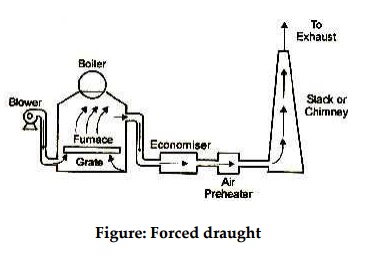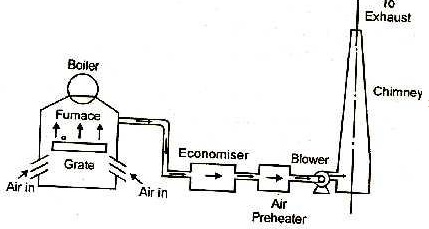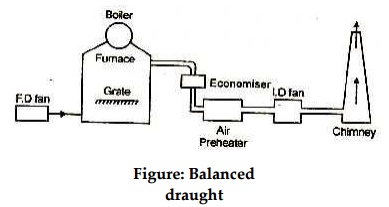Chapter: Mechanical and Electrical : Power Plant Engineering : Coal Based Thermal Power Plants
Forced Draught, Induced Draught, Balanced Draught and Artificial Draught
a) Forced Draught b) Induced Draught c) Balanced Draught
Artificial Draught
It has
been seen that the draught produced by chimney is affected by the atmospheric
conditions. It has no flexibility, poor efficiency and tall chimney is
required. In most of the modern power plants, the draught used must be
independence of atmospheric condition, and it must have greater flexibility
(control) to take the fluctuating loads on the plant.
Today’srgelasteam power plants requiring 20 thousand tons
of steam per hour would be impossible to run without the aid of draft fans. A
chimney of an reasonable height would be incapable of developing enough draft
to remove the tremendous volume of air and gases (400 × 103 m3
to 800 × 103 m3 per minutes). The further advantage of
fans is to reduce the height of the chimney needed.
The draught required in actual power plant is sufficiently
high (300 mm of water) and to meet high draught requirements, some other system
must be used, known as artificial draught. The artificial draught is produced
by a fan and it is known as fan (mechanical) draught. Mechanical draught is
preferred for central power stations.
Forced
Draught
In a forced draught system, a blower is installed near the
base of the boiler and air is forced to pass through the furnace, flues,
economizer, air-preheater and to the stack. This draught system is known as
positive draught system or forced draught system because the pressure and air
is forced to flow through the system. The arrangement of the system is shown in
figure. A stack or chimney is also in this system as shown in figure but its
function is to discharge gases high in the atmosphere to prevent the
contamination. It is not much significant for producing draught therefore
height of the chimney may not be very much.

Figure: Forced draught
Induced
Draught:
In this system, the blower is located near the base of the
chimney instead of near the grate. The air is sucked in the system by reducing
the pressure through the system below atmosphere. The induced draught fan sucks
the burned gases from the furnace and the pressure inside the furnace is
reduced below atmosphere and induces the atmospheric air to flow through the
furnace. The action of the induced draught is similar to the action of the
chimney. The draught produced is independent of the temperature of the hot
gases therefore the gases may be much
heat as possible in air-preheater and an izer and air-preheater are
incorporated in the hat the temperature of the gas handled by the em and its
function is similar as mentioned in forced draught but total draught produced
in induced draught system is the sum of the draughts produced by the fan and
chimney. The arrangement of the system is shown in figure.

Figure:
Induced draught
Balanced Draught:
It
is always preferable to use a combination of forced draught and induced draught
instead of forced or induced draught alone.
If
the forced draught is used alone, then the furnace cannot be opened either for
firing or inspection because the high pressure air inside the furnace will try
to blow out suddenly and there is every chance of blowing out the fire
completely and furnace stops.
If the induced draught is used alone, then also furnace
cannot be opened either for firing or inspection because the cold air will try
to rush into the furnace as the pressure inside the furnace is below
atmospheric pressure. This reduces the effective draught and dilutes the
combustion.

To
overcome both the difficulties mentioned above either using forced draught or
induced draught alone, a balanced draught is always preferred. The balanced
draught is a combination of forced and induced draught. The forced draught
overcomes the resistance of the fuel bed there fore sufficient air is supplied
to the fuel bed for proper and complete combustion. The induced draught fan
removes the gases from the furnace maintaining the pressure in the furnace just
below atmosphere. This helps to prevent the blow –off of flames when the doors
are opened as the leakage of air is inwards.
The
arrangement of the balanced draught is shown in figure. Also the pressure
inside the furnace is near atmospheric therefore there is no danger of blowout
or there is no danger of inrushing the air into the furnace when the doors are
opened for inspection.
Related Topics